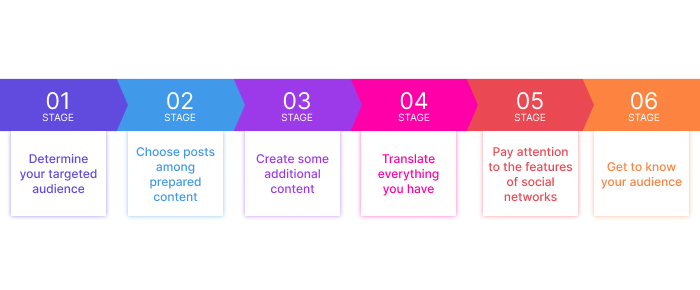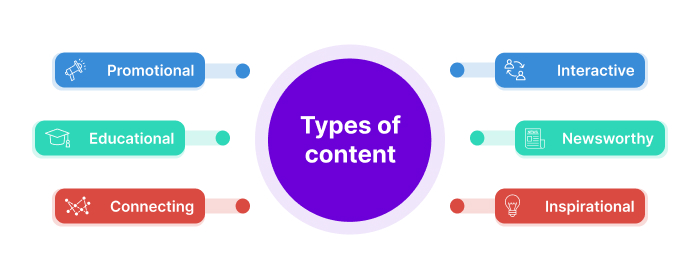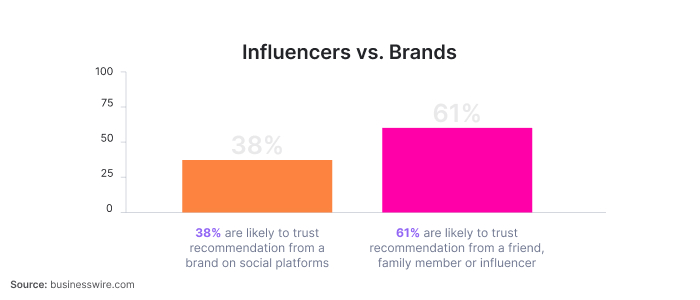 Mail
Mail
 Pocket
Pocket
Any marketer knows that a website or outdoor advertising alone is not enough for almost any business. To establish contact with the client and create a brand image, you also need interesting and engaging social networks. According to Sprout Social, 55% of users discover new brands through social media.
But what if you enter a new market? How should you prepare if you need to write posts and create content in another language? The process is complicated and costly, but interesting and beneficial for the international expansion of business. Read on for insights on social media translation.
Translation of content for social networks is one of the key tasks for those who start interacting with a new audience. You can just translate an educational platform or game, or you can create a full-fledged social media campaign for a new product: any of these tasks involve the presence of social networks.
At the same time, translation often requires time and financial costs. The good news is that, in most cases, you can simply translate the content that you already have, for example, posts about your product or a profile description of your company. But even this content requires the hard work of a specialist because a different language means a new culture and new marketing features. Professional translators will help you make the description of the company catchy, and your texts will become native.
Translating random posts that you find interesting is not the best strategy. Any business needs consistency, and the translation of social networks is no exception. Here is what the work on content translation should consist of:

Let’s talk about each step in detail.
In order to avoid translating too much and choose the right tone of voice, you need to know your future readers well. Here are the minimum details you need to know about your readers:
Knowing these characteristics of the audience, you will be able to convey thoughts more accurately and clearly, as well as provide the content in the correct form.
Don’t reinvent the wheel. Take texts that are already ready and have worked well for the existing audience. All of them can be translated and used on social networks. But be careful: consider the characteristics of the new readers. Choose texts regarding their culture and try to “speak their language”.
A new audience requires a new approach, so maybe not all of your old posts will seem good to them, or you will want to create completely new, different content. This is an important step in the development of new social media platforms. Thanks to this, new subscribers will feel a personalized approach, and following you will be more interesting for them.

Now that you have enough content, it’s time to translate it. Start small: translate the texts of posts, and try to select images and videos without words, so you don’t spend too many resources at the initial stage. You will need a professional translator who can write native texts and maybe even insert slang words into them. Don’t try to create multilingual content to get as many followers as possible because, eventually, such an account won’t be easy and interesting to read.
Every social network has its own rules. For example, on Twitter, you are limited to 280 characters; on Instagram, the length of posts is limited, too. You can still use emojis almost everywhere, but before that, take a look at the accounts of competitors and learn what and how many emojis will be appropriate. It will also be useful to create hashtag navigation. For a new language, it should be understandable and grammatically correct.
Here’s the main moment: you post content and gauge the reaction of the audience to your social media account. What content gets the most views and reactions? Where and what kind of comments do users leave? This is just the beginning of the journey – now you can see live how people react to your content and adapt it.
There are some more important tips that can take the quality of translation for social networks to an even higher level. Let’s list the main aspects to consider when entering the international market.
We’ve already mentioned that you need to choose a professional translation services company and work with it. Machine translation can significantly reduce the quality of your texts and even lead to misunderstandings. For example, you might want to use the word latte in Italian to mean coffee with milk, but this word actually just means milk. Readers may just not understand you.
Don’t try to become well-known everywhere at once. First, start developing your brand on one social network. A good strategy is to start with one that is well-developed in your country. Or you can also choose the most popular social network among your new audience to reach readers in the place where they usually spend their time.
Users aren’t online around the clock – they have different periods of activity. For example, at lunch or after work. Calculate the time difference and try to post exactly when your potential customers are online. To track this moment more precisely, use analytics services that will show when social network users are active.
Once you’ve developed one of your social media accounts enough, try influencer marketing. This can be much more effective than advertising because the personal advice of a person people already know is more credible. This can bring you a lot of subscribers, and in the long run, sales. According to Business Wire, 61% of consumers trust the product recommendations they get from influencers.

First, be sure to analyze the activities of competitors. What do their social networks look like, and what do you like about them? Pay attention to the visual features of the content in the country where you are going to publish posts. Even if you already have an initial visual strategy, try to adapt it for the new audience.
Now you understand the importance of quality social media localization and why it’s better to entrust this work to professionals. Palex translation agency has been working with over 80 languages for over 20 years, so we know the best approach to reach people from different countries. We will help you make professional translations for social network content and win a new audience. Email us at [email protected] for a free quote.





